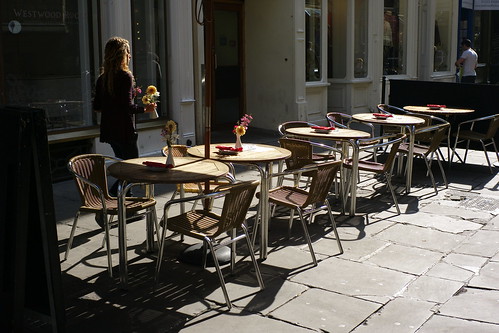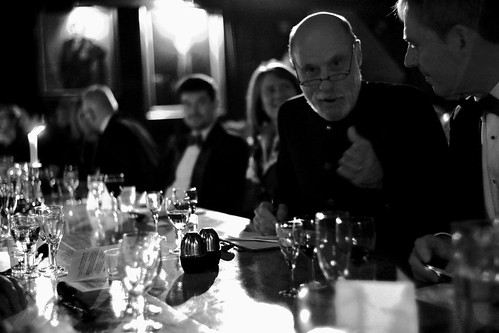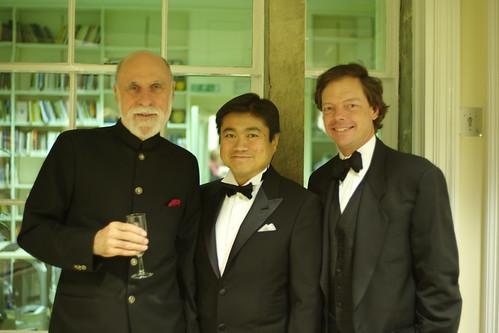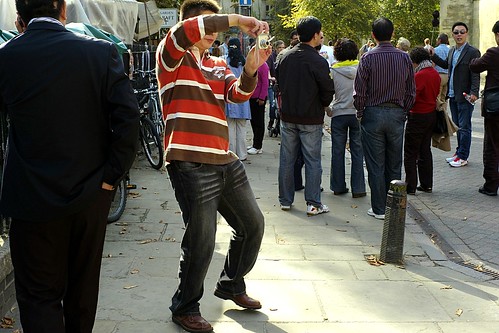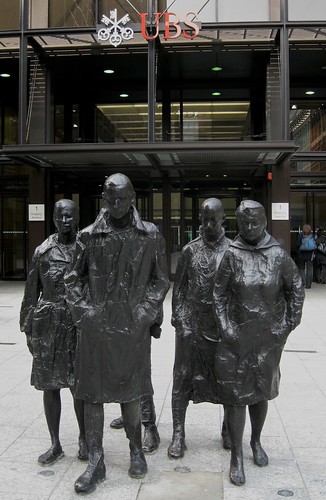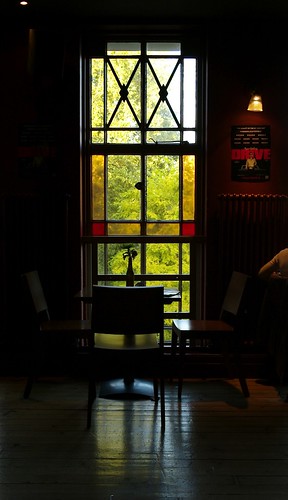The floral dance
You see, it’s like this…
Vint Cerf explains something to Nigel Shadbolt, High Table, Balliol, September 22, 2011.
Vint Cerf, Joi Ito and Christopher Michel
At the Oxford Internet Institute’s 10th anniversary celebrations on September 22, 2011.
Friedman impaled
Deliciously savage Review by Andrew Ferguson of Tom Friedman’s new book. Samples:
‘That Used to Be Us: How America Fell Behind in the World It Invented and How We Can Come Back” is a landmark in American popular literature: It is the first book by Thomas L. Friedman, the New York Times columnist and mega-best-selling author of “The World Is Flat,” “Hot, Flat, and Crowded” and so on, in which an alert reader can go whole paragraphs—whole pages, in a few instances—without fighting the impulse to chuck it across the room.
As a writer, Mr. Friedman is best known for his galloping assaults on Strunk and White’s Rule No. 9: “Do Not Affect a Breezy Manner.” “The World Is Flat” & Co. were cyclones of breeziness, mixing metaphors by the dozens and whipping up slang and clichés and jokey catchphrases of the author’s own invention. (The flattened world was just the beginning.)
And,
Mr. Friedman can turn a phrase into cliché faster than any Madison Avenue jingle writer. He announces that “America declared war on math and physics.” Three paragraphs later, we learn that we’re “waging war on math and physics.” Three sentences later: “We went to war against math and physics.” And onto the next page: “We need a systemic response to both our math and physics challenges, not a war on both.” Three sentences later: We must “reverse the damage we have done by making war on both math and physics,” because, we learn two sentences later, soon the war on terror “won’t seem nearly as important as the wars we waged against physics and math.” He must think we’re idiots.
As someone who’s on record as describing Friedman as a master of the catchy half-truth, I’m not his greatest fan. But I wonder if some of the asperity in Ferguson’s review has anything to do with the fact that it appears in the Wall Street Journal and Friedman is a star columnist on that paper’s deadly NYC rival, the New York Times?
Believing in neutrinos
Nicest Tweet of the morning came from Rory Cellan-Jones (@ruskin147 on Twitter):
Favourite neutrino joke so far: To get to the other side. Why did the neutrino cross the road?
Backstory: Wired sums it up thus:
If it’s true, it will mark the biggest discovery in physics in the past half-century: Elusive, nearly massless subatomic particles called neutrinos appear to travel just faster than light, a team of physicists in Europe reports. If so, the observation would wreck Einstein’s theory of special relativity, which demands that nothing can travel faster than light.
In fact, the result would be so revolutionary that it’s sure to be met with skepticism all over the world. “I suspect that the bulk of the scientific community will not take this as a definitive result unless it can be reproduced by at least one and preferably several experiments,” says V. Alan Kostelecky, a theorist at Indiana University, Bloomington. He adds, however, “I’d be delighted if it were true.”
The data come from a 1,300-metric-ton particle detector named Oscillation Project with Emulsion-tRacking Apparatus (OPERA). Lurking in Italy’s subterranean Gran Sasso National Laboratory, OPERA detects neutrinos that are fired through the Earth from the European particle physics laboratory, CERN, near Geneva, Switzerland. As the particles hardly interact at all with other matter, they stream right through the ground, with only a very few striking the material in the detector and making a noticeable shower of particles.
Over three years, OPERA researchers timed the roughly 16,000 neutrinos that started at CERN and registered a hit in the detector. They found that, on average, the neutrinos made the 730-kilometer, 2.43-millisecond trip roughly 60 nanoseconds faster than expected if they were traveling at light speed. “It’s a straightforward time-of-flight measurement,” says Antonio Ereditato, a physicist at the University of Bern and spokesperson for the 160-member OPERA collaboration. “We measure the distance and we measure the time, and we take the ratio to get the velocity, just as you learned to do in high school.” Ereditato says the uncertainty in the measurement is 10 nanoseconds.
Hmmm… I’ve always been fascinated by neutrinos, and often use physicists’ belief in them as evidence that religious fundamentalists aren’t the only people who believe implausible things. Just ponder this passage from the Wikipedia entry on the neutrino:
Most neutrinos passing through the Earth emanate from the Sun. About 65 billion (6.5×1010) solar neutrinos per second pass through every square centimeter perpendicular to the direction of the Sun in the region of the Earth.
What this implies, for example, is that a neutrino can pass right through the earth without noticing the obstacle in its path. Now I know (pace Rutherford’s famous experiment) that atoms are mostly empty space, but still… Makes you think, doesn’t it? It makes me think of JBS Haldane’s famous suspicion that “the Universe is not only queerer than we suppose, but queerer than we can suppose”.
The digital stance
It’s funny what the absence of viewfinders does to people. Observed in St John’s Street, Cambridge yesterday.
The p/w problem
This morning’s Observer column.
Here’s my problem. My password has expired and I need to set a new one. So I think of something and type it in. The system rejects it as being insecure. That’s funny – it’s about the same level of complexity as its expired predecessor. Then I remember – the organisation has recently acquired a new chief information officer and he’s embarked on a root-and-branch overhaul of the system, which presumably includes upgrading security rules.
So I think of a really secure, incomprehensible password and type it in. The system rejects it as laughably inadequate. So I try another and another and another. Same result each time. At this point, I’m getting irritated. Since it’s a Microsoft network, I decide to see what advice Microsoft can give me. I go to the company’s “Safety and Security Center” where’s there’s a helpful page on how to create strong passwords in four easy steps.
Walking away from responsibility
I took this picture on April 6, 2009, when it seemed appropriate in the light of bankers’ attitudes to the catastrophe their industry had created for the world.
Seems doubly ironic now in the light of news that the bank’s CEO has resigned as a result of the $2.3 billion loss incurred by a rogue trader.
Stained glass
Shot in the bar of the Arts Picturehouse cinema in Cambridge on September 21, while waiting for the screening of Page One.


